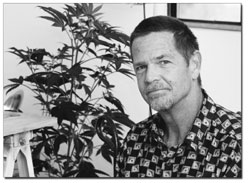| ||||
| The path to medical marijuana Local medical marijuana clinic on track for late September SideStory: Marijuana in the Land of Enchantment: N.M. struggles with medical marijuana
by Will Sands The push is on to make medical marijuana more accessible to Durangoans in need. A local man has partnered with an advocacy group to create the third medical marijuana clinic in the state, here in La Plata County. The clinic will meet on Sept. 24 and ease the process for locals with specific ailments to legally access, possess and grow marijuana. Though unknown to many state residents, Colorado actually has the strongest medical marijuana program in the nation, according to Aamann Degarth, who recently opened a local chapter of the The Hemp and Cannabis (THC) Foundation. Amendment 20, which legalized marijuana for certain medical uses, was approved by Colorado voters in 2000. Unlike the 11 other states that have also legalized medical marijuana, Colorado’s amendment is now embedded within the state constitution and has survived a significant legal challenge. “Colorado’s legislation is the strongest in the country,” Degarth said. “We are the only state in the nation that has our law written into the state constitution. On the whole, I feel that Colorado is doing a great job with medical marijuana.” However, prescribed marijuana for ailments ranging from chronic pain to cancer or AIDS remains out of reach for most. The main obstacle, according to Degarth, is receiving a prescription from doctors who either fear prosecution or are barred from writing one. The THC Foundation is currently pushing for that to change in Southwest Colorado. “It’s the same story all over,” Degarth said. “Doctors don’t want to write prescriptions for medical marijuana because they’re playing with the American Medical Association, and they won’t allow it.” Degarth first entered the medical marijuana maze when he helped a chronically ill friend get a prescription. The effort required a trip to Denver, a several hour-long wait and then a return trip. “There’s no way my friend could have done it without assistance,” he said. Several years later, Degarth sought his own prescription after a climbing fall landed him with chronic arthritis and persistent pain. Like many others, he sought local medical assistance but was denied a prescription. Degarth then took the trip to Denver himself and kicked off a crusade to make medical marijuana more accessible for Southwest Colorado residents. “My compassion directed me toward this goal,” he said. “I think it’s really vital that we get a medical marijuana clinic in place in this area.” The clinic would actually be more workshop than a bricks-and-mortar medical structure. On Sept. 24, Degarth and the THC Foundation are planning to rent a couple hotel rooms and host a clinic to certify people for medical marijuana and then write prescriptions.
At the THC Foundation clinics, doctors conduct thorough physical exams, and patients must have current medical records validating their medical conditions. After a successful review, the doctor will compose medical documents that permit the patient to legally possess, use and grow medical marijuana. Depending on local needs and interest, the plan is to host such a Durango clinic every 30 to 60 days. “The doctors that are working with the foundation are basically retired and don’t write prescriptions for anything but medical marijuana,” Degarth said. “In a given year, they’ll travel to locations all over the country.” Such a clinic is necessary, according to Degarth, because medical marijuana is the only viable option for some people. It is especially helpful to those with intense chronic pain and is one of the few drugs that will counteract the severe side effects associated with many treatments. “I’ve run into a number of people whose pain is so chronic that no pain pill on the planet will get rid of it,” he said. “But if they eat medical marijuana, it kills the pain and puts them into a meditative state, where their mind goes to other things. Plus, drugs you get for other conditions often have serious side effects and medical marijuana helps with those issues.” In the lead-up to a local clinic, Degarth acknowledged that medical marijuana is not currently viewed in a favorable light by the White House or law enforcement agencies. In fact, public health officials throughout the nation have been threatened with prosecution for permitting medical marijuana use. However, Degarth countered that medical marijuana is about easing pain and suffering, not about getting high. “If what I’m doing can assists other people, and I wind up going down as a result, it was worth it,” he said. “It’s been an honor for me to be in a position of assisting people.” For more information, contact the THC Foundation at 259-0837. •
|
In this week's issue...
- May 15, 2025
- End of the trail
Despite tariff pause, Colorado bike company can’t hang on through supply chain chaos
- May 8, 2025
- Shared pain
Dismal trend highlights need to cut usage in Upper Basin, too
- April 24, 2025
- A tale of two bills
Nuclear gets all the hype, but optimizing infrastructure will have bigger impact



